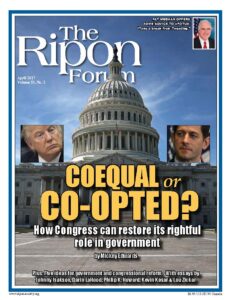 WASHINGTON, D.C. – As Donald Trump nears the end of his first 100 days in office, the latest edition of The Ripon Forum examines the balance of power between Congress and the President and explores a number of reforms designed to make Washington more efficient and accountable in the coming years. Authors and articles in this edition include:
WASHINGTON, D.C. – As Donald Trump nears the end of his first 100 days in office, the latest edition of The Ripon Forum examines the balance of power between Congress and the President and explores a number of reforms designed to make Washington more efficient and accountable in the coming years. Authors and articles in this edition include:
– Former Congressman and current Aspen Institute scholar Mickey Edwards, writing about the relationship between the Legislative and Executive Branches and whether Congress is “Coequal or Co-opted?” – “Madison was no Nostradamus,” Edwards writes, referring to one of America’s Founding Fathers. “He imagined a Congress of men who would cloak themselves in the legitimacy of their powerful institution. He appears to have been unable to imagine a Congress full of men and women who would increasingly act as though they were water-bearers for the executive.” In addition to delivering this indictment, Edwards also offers up a series of recommendations on how the balance of power between the two branches can be restored.
– Author and good government expert Philip K. Howard, writing about the bloated and inefficient federal bureaucracy in Washington and why the President should move forward unilaterally with civil service reform – “Accountability is basically nonexistent for federal civil servants,” Howard observes. “Job performance is irrelevant. Indeed, more people die on the job than are terminated or demoted.” To address this problem, Howard believes the President should issue an executive order to “scrap the civil service system and replace it with a framework more compatible with reform proposals such as the one proposed by the Partnership for Public Service.”
– U.S. Sen. Johnny Isakson (GA), writing about the broken appropriations process and why Congress should move to a biennial budgeting system – “Biennial budgeting would convert Congress’ current broken annual appropriations process to a two-year budget cycle,” the Georgia lawmaker writes, “with one year for appropriating federal dollars and the other year devoted to oversight of federal programs. This would allow for better oversight before we start spending more. Oversight is critical to running a business or even a household, and it should be a priority when spending taxpayer dollars.”
– U.S. Rep. Darin LaHood (IL-18), writing about congressional dysfunction and the need to reorganize the House so it can better meet the challenges facing America today – “When the governing process fails to function, reform is necessary,” the second term Congressman writes. “It is time to return to performance-based governing, restore order and effectiveness, re-establish a balance of power and re-create an environment in which Congress is trusted by the People.”
– R Street Institute senior fellow Kevin R. Kosar, writing about the decrease in congressional staff over the past several decades and how it has impacted the ability of Congress to govern – “The number of people who work for the congressional committees, the founts of public policy and government oversight, has gone down more than 25 percent the past four decades,” Kosar writes. “The GOP desperately needs to revise its mindset on congressional capacity. Shrinking the legislative branch and bad-mouthing it has not worked.”
– Forum Editor Lou Zickar, writing about the effort that senior presidential advisor Jared Kushner is heading up to make government more innovative and why a bipartisan proposal that Congress almost approved 40 years ago could help him achieve that goal. “In 1977,” Zickar writes, “establishing a federal Sunset Commission was one of the top three priorities on Capitol Hill. Its supporters ranged from Republicans Barry Goldwater and Jesse Helms to Democrats George McGovern and Edward Kennedy.” (In a sign of its bipartisan appeal, Kennedy calls the sunset concept “one of the most imaginative and innovative approaches to government reform that has been proposed in many years.”)
At a time when the President is saying he supports term limits for members of Congress, the latest edition of the Forum also features Florida Congressman Ron DeSantis (FL-6) and University of Kansas Professor Burdett Loomis squaring off in a debate about whether terms limits are needed, or whether they would do more harm than good.
In other op-eds, Doug Brake of the Information Technology and Innovation Foundation makes the case for investing in rural broadband as part of an infrastructure bill that may be considered later this year, and Jacqueline Varas of the American Action Forum provides an update on the issue of trade.
And in the latest Ripon Profile, Pennsylvania Congressman Pat Meehan talks about the lessons he learned in his first job and his priorities in the House of Representatives this year.
The Ripon Forum is published six times a year by The Ripon Society, a public policy organization that was founded in 1962 and takes its name from the town where the Republican Party was born in 1854 – Ripon, Wisconsin. One of the main goals of The Ripon Society is to promote the ideas and principles that have made America great and contributed to the GOP’s success. These ideas include keeping our nation secure, keeping taxes low and having a federal government that is smaller, smarter and more accountable to the people.



